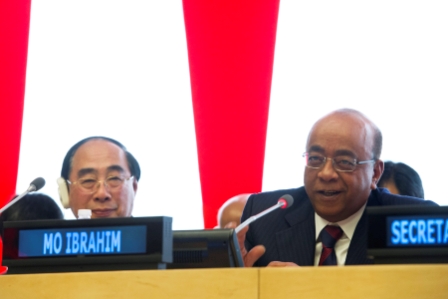Unleashing the potential of Transcorp plc
Transcorp plc was envisioned as a transnational company of Nigeria that would bring together the strength of capital and unity of purpose in order to give Nigeria a strong institution with the ability to compete for business with other multinationals on a global scale starting with Nigeria, Africa and then the world. (Photo: Tony Elumelu)
This vision was mostly the handiwork of Ndi Okereke-Onyiuke, the former director-general, Nigerian Stock Exchange, NSE.
If you know her well, you will acknowledge that despite her obvious short comings, she is a one woman army who is excellent at execution. She convinced the then President Olusegun Obasanjo that creating a Nigerian version of Daweo, (the giant Korean multinational company involved in several large industries), was the way to go.
Obasanjo may have been convinced because of the very low participation in the rebuilding of Liberia and Sierra Leone, where Nigeria took the leadership role in stopping the civil wars in those countries, investing money and the blood of young Nigerians in a war that took nearly four years to execute.
Despite the huge investment in human and material resources, Nigeria was unable to take advantage of its influence to get Nigerian businesses to take any major role in rebuilding these two countries.
The reason was mainly attributed to the small size of the Nigerian construction industry. It was also thought that the capacity to take part meaningfully was not present in most Nigerian companies.
Transcorp was seen as a possible institution to take the initiative to correct this unfortunate situation.
Obasanjo brought his business friends on board, and some of the plump assets lined up for privatisation at the time, ended up with Transcorp, rightly or wrongly. The idea was so compelling that other Nigerians and institutions fought to be a part of it. The initial public offering (IPO) that followed the private placement to raise seed capital failed, despite the large number of investors it enticed from the mostly uninformed investors who put N22 billion in the company.
Analysts say part of the reason the IPO failed was the mispricing that put an N8 margin on a N1 share the early investors paid. It should also be noted that the major assets acquired at the time like NITEL (Nigerian Telecommunication Limited) and the oil bloc concession OPL281 were acquired on borrowed money or only partly paid for.
A better financing programme would have been to raise capital specifically for these companies. If the first IPO by Transcorp was for financing NITEL or Transcorp Hilton, investors would have over subscribed the offer, because there would be something to analyse and a cash flow stream to bank on and it would have attracted knowledgeable investors. The omnibus offering it did was unfocused and lacked credibility.
Unfortunately, this was the last successful thing it did. This very viable idea was too big for those who conceived it to completely execute to the satisfaction of anyone to date. The first problem was the position of the chairman – it generated a lot of controversy. The effort to remotely manage the company also ended in putting together discordant management, leading to several changes at the top, creating the first doubts about its ability to reach its potential.
It was amazing that the great mind that conceived this great idea could not see that the idea was bigger than one person. It did not occur at any point that the essential thing was how to build the company and enhance the brand equity. The negative publicity that followed, the first of many such instances of bad press, took its toll on the company.
Next was the confusion in focus, despite owning several valuable assets and raising billions of naira, it was unable to clearly define its mission or primary focus. It failed to do anything meaningful, bar one acquisition, the already successful Hilton Hotel which it quickly renamed Transcorp Hilton. This has since become the cash cow.
The recent takeover of the company by Tony Elumelu and his group with about 22 percent of the company, according to published reports, is seen as the possible life line the company requires. Elumelu having just left his position as CEO of UBA plc is considered a stabilising core investor that can help put the company back on track. He has experience in building businesses.
To be able to do this, honest management and focus will be the key. The company must immediately focus on its strengths and exit those areas that are not its core strength, such as its oil concession.
Instead, it should reduce its stake to a minority one. It must sell its majority interest to raise quick cash and focus on the two major areas it already has footprints – hospitality and food processing.
The demand gaps in these two industries and the strong brand that Transcorp can be is the kind of strength to build on. Transcorp is rich in assets, rich in support, due to its large shareholder base (which can also be used to raise capital in the future).
Once you can convince investors that the mostly under-used potential can be unleashed, shareholders will want to see a quick realisation of the potential we saw when we originally invested.
We will be looking out to make sure the new management delivers on their promises. Anything less will be unacceptable.
Victor Ogiemwonyi
Ogiemwonyi is the CEO of Partnership Investment plc, Ikoyi, Lagos victorogiemwonyi@gmail.com
Stay with Sierra Express Media, for your trusted place in news!
© 2012, https:. All rights reserved.



